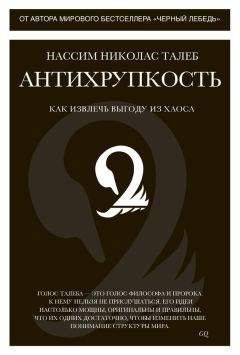Ознакомительная версия.
Martin, B., M. P. Mattson, et al., 2006, “Caloric Restriction and Intermittent Fasting: Two Potential Diets for Successful Brain Aging.” Ageing Research Reviews 5 (3): 332–353.
Masoro, E. J., 1998, “Hormesis and the Antiaging Action of Dietary Restriction.” Experimental Gerontology 33 (1–2): 61–66.
Mattson, M. P., 2008, “Hormesis Defined.” Ageing Research Reviews 7 (1): 1–7.
Mattson, M. P., and R. Wan, 2005, “Beneficial Effects of Intermittent Fasting and Caloric Restriction on the Cardiovascular and Cerebrovascular Systems.” Journal of Nutritional Biochemistry 16 (3): 129–137.
Matz, David, 2002, Daily Life of the Ancient Romans. Indianapolis: Hackett.
McAleer, M., A. Pagan, and P. Volker, 1985, “What Will Take the Con Out of Econometrics?” American Economic Review 75 (3): 293–307.
McCabe, D. P., and A. D. Castel, 2008, “Seeing Is Believing: The Effect of Brain Images on Judgments of Scientific Reasoning.” Cognition 107: 343–352.
McCloskey, D., and S. Ziliak, 1996, “The Standard Error of Regressions.” Journal of Economic Literature 34 (1): 97–114.
McConaugby, D., C. Matthews, and A. Fialko, 2001, “Founding Family Controlled Firms: Performance, Risk and Value.” Journal of Small Business Management 39: 31–49.
McCraw, Thomas 2007, Prophet of Innovation: Joseph Schumpeter and Creative Destruction. Cambridge, Mass.: The Belknap Press of Harvard University.
McGill, S., 2007, Low Back Disorders: Evidence-Based Prevention and Rehabilitation. Human Kinetics Publishers.
McGrath, R. G., 1999, “Falling Forward: Real Options Reasoning and Entrepreneurial Failure.” Academy of Management Review: 13–30.
McKnight, Scot, 2009, Fasting. Thomas Nelson.
McMahon, Darrin M., 2001, Enemies of the Enlightenment: The French Counter-Enlightenment and the Making of Modernity. Oxford: Oxford University Press.
MÉgraud, F., and H. Lamouliatte, 1992, “Helicobacter pylori and Duodenal Ulcer.” Digestive Diseases and Sciences 37 (5): 769–772.
Mehta, R., R. J. Zhu, et al., 2012, “Is Noise Always Bad? Exploring the Effects of Ambient Noise on Creative Cognition.”
Meisenzahl, R., and J. Mokyr, 2011, The Rate and Direction of Invention in the British Industrial Revolution: Incentives and Institutions. National Bureau of Economic Research.
Menard, W., and G. Sharman, 1976, “Random Drilling.” Science 192 (4236): 206–208.
Meng, X., N. Qian, and P. Yared, 2010, The Institutional Causes of China’s Great Famine, 1959–61. National Bureau of Economic Research.
Mercier, H., and D. Sperber, 2011, “Why Do Humans Reason? Arguments for an Argumentative Theory.” Behavioral and Brain Sciences 34 (2): 57–74.
Meslin, Michel, Alain Proust, and Ysé Tardan-Masquelier, eds., 2006, La quête de guérison: Médicine et religions face à la souffrance. Paris: Bayard.
Meyers, Morton A., M.D., 2007, Happy Accidents: Serendipity in Modern Medical Breakthroughs. New York: Arcade.
MichÁn, S., Y. Li, M. Chou, E. Parrella, H. Ge, J. Long, J. Allard, K. Lewis, M. Miller, and W. Xu, 2010, “SIRT1 Is Essential for Normal Cognitive Function and Synaptic Plasticity.” Journal of Neuroscience 30 (29): 9695–9707.
Micklesfield, L., L. Rosenberg, D. Cooper, M. Hoffman, A. Kalla, I. Stander, and E. Lambert, 2003, “Bone Mineral Density and Lifetime Physical Activity in South African Women.” Calcified Tissue International 73 (5): 463–469.
Miller, John H., and Scott E. Page, 2007, Complex Adaptive Systems: An Introduction to Computational Models of Social Life. Princeton, N.J.: Princeton University Press.
Mindell, D. A., 2002, Between Human and Machine: Feedback, Control, and Computing Before Cybernetics. Baltimore: Johns Hopkins University Press.
Mitchell, Mark T., 2006, Michael Polanyi: The Art of Knowing. ISI Books.
Mokyr, Joel, 1990, The Lever of Riches: Technological Creativity and Economic Progress. Oxford: Oxford University Press.
Mokyr, Joel, ed., 1999, The British Industrial Revolution: An Economic Perspective. Westview Press.
Mokyr, Joel, 2002, The Gifts of Athena: Historical Origins of the Knowledge Economy. Princeton, N.J.: Princeton University Press.
Mokyr, Joel, 2005, “Long-Term Economic Growth and the History of Technology.” In Philippe Aghion and Steven N. Durlauf, eds., Handbook of Economic Growth, Vol. 1B. Elsevier.
Mokyr, Joel, 2009, The Enlightened Economy: An Economic History of Britain, 1700–1850. New Haven: Yale University Press.
Morens, David M., 1999, “Death of a President.” New England Journal of Medicine 342: 1222.
Morris, Ivan I., 1975, The Nobility of Failure: Tragic Heroes in the History of Japan. Farrar, Strauss and Giroux.
Mudd, L., W. Fornetti, and J. Pivarnik, 2007, “Bone Mineral Density in Collegiate Female Athletes: Comparisons Among Sports.” Journal of Athletic Training, Jul-Sep 42 (3): 403–408.
Mudry, Philippe, 2006, Medicina, soror philosophiae. Éditions BHMS.
Muldrew, C., 1993, “Credit and the Courts: Debt Litigation in a Seventeenth-Century Urban Community.” Economic History Review 46 (1): 23–38.
Mutch, W.A.C., T. G. Buchman, et al., 2007, “Biologically Variable Ventilation Improves Gas Exchange and Respiratory Mechanics in a Model of Severe Bronchospasm.” Critical Care Medicine 35 (7): 1749.
Nasr, G., 2008, “Applying Environmental Performance Indices Towards an Objective Measure of Sustainability in the Levant.” International Journal of Sustainable Development 11 (1): 61–73.
Nasr, G., 2009, “Limitations of the Hydraulic Imperative: The Case of the Golan Heights.” Water Resources Development 25 (1): 107–122.
Nelson, R. R., 2005, Technology, Institutions, and Economic Growth. Cambridge, Mass.: Harvard University Press.
Neumaier, T., J. Swenson, et al., 2012, “Evidence for Formation of DNA Repair Centers and Dose-Response Nonlinearity in Human Cells.” Proceedings of the National Academy of Sciences 109 (2): 443–448.
Nicholas, Jean, 2008, La rebellion française: Mouvements populaires et conscience sociale 1661–1789. Gallimard.
Nichols, J. F., J. E. Palmer, et al., 2003, “Low Bone Mineral Density in Highly Trained Male Master Cyclists.” Osteoporosis International 14 (8): 644–649.
North, Douglass C., 1990, Institutions, Institutional Change and Economic Performance. Cambridge: Cambridge University Press.
Nowak, Martin A., 2006, Evolutionary Dynamics: Exploring the Equations of Life. Cambridge, Mass.: The Belknap Press of Harvard University.
Nutton, Vivian, 2004, Ancient Medicine. Psychology Press.
O’Hara, Kieron, 2004, Trust: From Socrates to Spin. Icon Books.
Oakeshott, Michael, 1975, On Human Conduct. Oxford: Clarendon Press.
Oakeshott, Michael, 1991, “The Rationalist.” Quadrant 35 (3): 87.
Oakeshott, Michael, 1962, 1991, Rationalism in Politics and Other Essays. Liberty Fund.
Ober, J., 2010, Wealthy Hellas, Vol. 140. Baltimore: Johns Hopkins University Press.
Ogilvie, Sheilagh, 2011, Institutions and European Trade: Merchant Guilds 1000–1800. Cambridge: Cambridge University Press.
Orlov, Dmitry, 2011, Reinventing Collapse: The Soviet Experience and American Prospects. New Society Publishers.
Palmieri, Nicoletta, ed., 2003, Rationnel et irrationnel dans la médecine ancienne et médiévale. Saint-Étienne: Université de Saint-Étienne.
Pamuk, Sevket, 2006, “Estimating Economic Growth in the Middle East Since 1820.” Journal of Economic History 66 (3).
Parsons, P. A., 2000, “Hormesis: An Adaptive Expectation with Emphasis on Ionizing Radiation.” Journal of Applied Toxicology 20 (2): 103–112.
Pat-Horenczyk, R., and D. Brom, 2007, “The Multiple Faces of Post-Traumatic Growth.” Applied Psychology 56 (3): 379–385.
Pautler, P. A., 2003, “Evidence on Mergers and Acquisitions.” Antitrust Bulletin 48: 119.
Pavitt, K., 1998a, “The Inevitable Limits of EU R&D Funding.” Research Policy 27 (6): 559–568.
Pavitt, K., 1998b, “The Social Shaping of the National Science Base.” Research Policy 27 (8): 793–805.
Payer, Lynn, 1996, Medicine and Culture. New York: Henry Holt.
Pears, David, 2006, Paradox and Platitude in Wittgenstein’s Philosophy. Oxford: Oxford University Press.
PÉrez-Jean, Brigitte, 2005, Dogmatisme et scepticisme. Presses Universitaires du Septentrion.
Petchey, O. L., and J. A. Dunne, 2012, “Predator-Prey Relations and Food Webs.” Metabolic Ecology: A Scaling Approach. Wiley, p. 86.
Petroski, Henry, 2006, Success Through Failure: The Paradox of Design. Princeton, N.J.: Princeton University Press.
Pigeaud, Jackie, 2006, La maladie de l’âme. Les Belles Lettres.
Pigolotti, S., A. Flammini, et al., 2005, “Species Lifetime Distribution for Simple Models of Ecologies.” Proceedings of the National Academy of Sciences of the United States of America 102 (44): 15747.
Pirenne, Henri, 2005, Mahomet et Charlemagne. Presses Universitaires de France.
Pisano, G. P., 2006a, “Can Science Be a Business?” Harvard Business Review 10: 1–12.
Pisano, G. P., 2006b, Science Business: The Promise, The Reality, and the Future of Biotech. Cambridge, Mass.: Harvard Business Press.
Pischon, T., et al., 2008, “General and Abdominal Adiposity and Risk of Death in Europe.” New England Journal of Medicine 359: 2105–2120.
Pi-Sunyer, X., et al., 2007, “Reduction in Weight and Cardiovascular Disease Risk Factors in Individuals with Type 2 Diabetes: One-Year Results of the Look AHEAD Trial.” Diabetes Care 30: 1374–1383.
Piterbarg, V. V., and M. A. Renedo, 2004, “Eurodollar Futures Convexity Adjustments in Stochastic Volatility Models.” Working Paper.
Pluchino, A., C. Garofalo, et al., 2011, “Accidental Politicians: How Randomly Selected Legislators Can Improve Parliament Efficiency.” Physica A: Statistical Mechanics and Its Applications.
Polanyi, M., 1958, Personal Knowledge: Towards a Post-Critical Philosophy. London: Routledge and Kegan Paul.
Pomata, Gianna, and Nancy G. Siraisi, eds., 2005, Historia: Empiricism and Erudition in Early Modern Europe. Cambridge, Mass.: The MIT Press.
Popkin, Richard, 2003, The History of Scepticism: From Savonarola to Bayle. Oxford: Oxford University Press.
Popper, Karl, 1961, The Poverty of Historicism. London: Routledge.
Pories, W. J., et al., 1995, “Who Would Have Thought It? An Operation Proves to Be the Most Effective Therapy for Adult-Onset Diabetes Mellitus.” Annals of Surgery 222: 339–350; discussion 350–352.
Pormann, Peter E., and Emilie Savage-Smith, 2007, Medieval Islamic Medicine. Georgetown University Press.
Porter, Roy, 2002, Blood and Guts: A Short History of Medicine. Penguin.
Porter, Roy, 2003, Flesh in the Age of Reason. W. W. Norton.
Portet, P., 2002, La mesure géométrique des champs au moyen âge. Librairie Droz.
Posner, M. V., 1996, “Corrupted by Money?” Nature 382: 123–124.
Pratt, John W., 1964, “Risk Aversion in the Small and in the Large,” Econometrica 32 (January – April), 122–136.
Pritchard, James B., ed., 2011, The Ancient Near East: An Anthology of Texts and Pictures. Princeton, N.J.: Princeton University Press.
Pritchett, L., 2001, “Where Has All the Education Gone?” World Bank Economic Review 15 (3): 367.
Radak, Z., H. Y. Chung, et al., 2005, “Exercise and Hormesis: Oxidative Stress-Related Adaptation for Successful Aging.” Biogerontology 6 (1): 71–75.
Raffaghello, L., F. Safdie, G. Bianchi, T. Dorff, L. Fontana, and V. Longo, 2010, “Fasting and Differential Chemotherapy Protection in Patients.” Cell Cycle 9 (22): 4474.
Rashed, Marwan, 2007, L’héritage aristotélien. Les Belles Lettres.
Rattan, S.I.S., 2008, “Hormesis in aging.” Ageing Research Reviews 7 (1): 63–78.
Rautava, E., M. Lehtonen-Veromaa, H. Kautiainen, S. Kajander, and O. J. Heinonen, 2007, “The Reduction of Physical Activity Reflects on the Bone Mass Among Young Females: A Follow-Up Study of 143 Adolescent Girls.” Osteoporosis International (18) 7: 915–922.
Razay, G. and G. K. Wilcock, 1994, “Hyperinsulinaemia and Alzheimer’s Disease.” Age and Ageing 23 (5): 396–399.
Read, D., S. Frederick, and M. Airoldi, 2012, “Four Days Later in Cincinnati: Longitudinal Tests of Hyperbolic Discounting.” Acta Psychologica 140 (2): 177–185, PMID: 22634266.
Redberg, R. F., and M. H. Katz, 2012, “Healthy Men Should Not Take Statins.” JAMA 307 (14): 1491–1492.
Rees, Martin, 2003, Our Final Century: Will Civilisation Survive the Twenty-First Century? Arrow Books.
Rein, R., K. Davids, et al., 2010, “Adaptive and Phase Transition Behavior in Performance of Discrete Multi-Articular Actions by Degenerate Neurobiological Systems.” Experimental Brain Research 201 (2): 307–322.
Ridley, Matt, 2010, The Rational Optimist: How Prosperity Evolves. 4th Estate.
Riffard, Pierre, 2004, Les philosophes: Vie intime. Presses Universitaires de France.
Robb, Graham, 2007, The Discovery of France. Picador.
Roberts, B. H., 2012, The Truth About Statins: Risks and Alternatives to Cholesterol-Lowering Drugs. New York: Simon and Schuster.
Roberts, Royston M., 1989, Serendipity: Accidental Discoveries in Science. Wiley.
Roll, R., 1986, “The Hubris Hypothesis of Corporate Takeovers.” Journal of Business 59: 197–216.
Ознакомительная версия.




